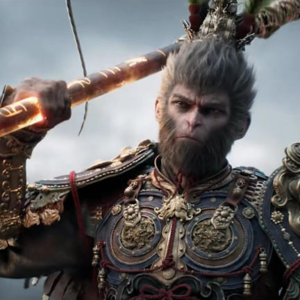让我们一起用轻松,简单易懂的英语一起来解读西游记吧!今天我们终于来到了西游记的大结局:径回东土 五圣成真!你听懂了多少?!快来试试自己的英语听力吧!
感谢大家一路以来的陪伴,我们以英语的方式解读了西游记全部的100回。西游记对于每个中国人都非常熟悉,但是用英语解读后,很多名字或者单词可能需要重新学起来了。希望这100回英语的解读,可以帮助大家学习到一些新的英语单词和知识点!再次谢谢大家的一路陪伴!
该文本节选自中国古典小说《西游记》的第一百回,亦是全书的结尾部分。此回主要讲述唐僧师徒四人功德圆满,抵达长安,向唐太宗交付经书,并受到盛情款待。 随后,他们被八大金刚护送返回灵山,如来佛祖亲自为五圣(唐僧、孙悟空、猪八戒、沙僧及白龙马)加封果位。 唐僧被封为旃檀功德佛,孙悟空为斗战胜佛,猪八戒为净坛使者,沙僧为金身罗汉,白龙马为八部天龙。 小说至此结束,象征着取经的圆满完成以及修行终获正果。 最后以众佛菩萨的名号和一段回向偈作为庄严的结尾。
1. 唐僧前世为金蝉子,因轻慢佛法被贬,此番取经功劳甚大,被封为旃檀功德佛。这不仅是对他历经磨难取得真经的肯定,更象征着他最终回归佛性,达到了极高的精神境界
2. 孙悟空曾大闹天宫,后皈依佛门,在取经路上降妖伏魔,功勋卓著,被封为斗战胜佛。他曾经的桀骜不驯转化为护持正法的坚定意志,最终获得了与其能力相匹配的崇高地位。同时,他头上的金箍也自然消失,这象征着束缚他心性的外在力量的解除,他的内心真正得到了自由和解脱。
3. 猪八戒虽有顽心和色情未泯,但在取经路上也尽力挑担,被封为净坛使者。虽然他对这个果位有所不满,但如来认为这是一个“有受用的品级”,这表明即使是看似缺点较多的人物,只要在修行中有所贡献,也能得到认可和提升。
4. 沙悟净诚敬皈依,保护唐僧,登山牵马有功,被封为金身罗汉。他从曾经的河妖转变为虔诚的佛教徒,最终获得了罗汉果位,象征着他内心的平静和对佛法的坚定信仰。
5. 白龙马驮负唐僧和经书,亦有功劳,被封为八部天龙马。它从一条犯错的龙子最终成为护持佛法的力量,也体现了通过修行可以改变命运,提升境界。
师徒回到长安后,在洪福寺中,猪八戒不再吵嚷茶饭,孙悟空和沙僧也变得稳重。这表明经过十四年的艰苦修行,他们的心性已经得到了锤炼,曾经的焦躁和欲望都得到了抑制和转化。正如原文所说:“只因道果完成,自然安静”
#英语听力 #西游记 #练习英语 #沉浸式英语练习 #用英语解读中国文化
Thank you all for your companionship along the way. Together, we have completed an English interpretation of all 100 chapters of Journey to the West. While this classic novel is deeply familiar to every Chinese person, interpreting it in English meant many names and terms had to be relearned. We hope that this English journey through the 100 chapters has helped you pick up new English vocabulary and insights along the way. Thank you once again for being with us throughout this experience!
The following excerpt is from Chapter 100 of Journey to the West, which also marks the conclusion of the novel. In this final chapter, the monk Tang Sanzang and his disciples successfully complete their pilgrimage, returning to Chang’an to present the scriptures to Emperor Taizong. They are warmly received and honored for their efforts. Soon after, they are escorted back to the Thunder Monastery by the Eight Vajra Guardians, where the Buddha himself bestows divine titles upon the five travelers—Tang Sanzang, Sun Wukong, Zhu Bajie, Sha Wujing, and the White Dragon Horse.
- Tang Sanzang, who was the reincarnation of the Golden Cicada, had once been exiled for disrespecting the Buddha’s teachings. After enduring countless trials to retrieve the scriptures, he is granted the title Buddha of Sandalwood Merit. This not only affirms the success of his arduous journey but also symbolizes his return to Buddha-nature and the attainment of a high spiritual state.
- Sun Wukong, who had once caused havoc in Heaven, later converted to Buddhism and made great contributions by defeating demons throughout the journey. He is honored as the Victorious Fighting Buddha. His transformation—from rebelliousness to unwavering dedication in defending the Dharma—earns him a noble title worthy of his strength. The golden headband on his head naturally disappears, signifying the removal of external restraints and the achievement of true inner freedom and enlightenment.
- Zhu Bajie, though often indulgent and lustful, also carried his share of the burden on the journey and is appointed Cleanser of the Altar. While he is somewhat dissatisfied with this title, the Buddha describes it as a “position of enjoyment,” underscoring that even those with flaws can earn recognition and spiritual advancement through contribution and effort.
- Sha Wujing, who faithfully followed and protected Tang Sanzang and helped lead the horse over mountains, is granted the title Golden Arhat. Once a river demon, he is now a devout practitioner, and his transformation symbolizes a calm mind and deep faith in the Buddha's teachings.
- The White Dragon Horse, who carried Tang Sanzang and the scriptures, is awarded the title Heavenly Dragon of the Eight Divisions. Once a dragon who committed a transgression, his contribution to the journey shows that through cultivation and service to the Dharma, even one's fate and spiritual rank can be elevated.
Upon returning to Chang 'An, the disciples settle at Hongfu Temple. Zhu Bajie no longer complains about food, and both Sun Wukong and Sha Wujing have grown more composed. This suggests that after fourteen years of rigorous practice and trials, their temperaments have been refined. The restlessness and desires they once had have been subdued and transformed. As the original text beautifully puts it:
“With the completion of their cultivation, peace comes naturally.”



 108
108 0
0